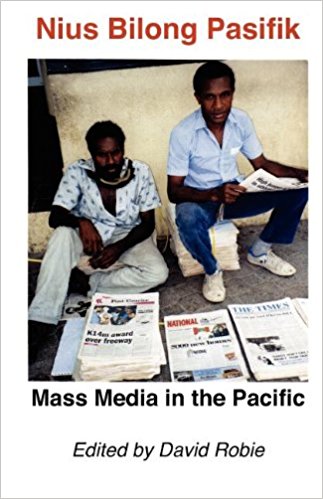REVIEW: By Murray Horton
It is a graphic illustration of corporate New Zealand’s colonial mentality that our Eurocentric news media tell us all about the bludgers of Buckingham Palace and nothing about the brutalised people of Bougainville. It is our loss and Papua New Guinea’s gain that David Robie, this country’s foremost freelancer specialising in the Pacific, could no longer make a living here and now lectures in journalism at the University of Papua New Guinea.
Robie gets through a formidable work rate. As well as being a fulltime lecturer, he has revitalised the University of Papua New Guinea (UPNG) student newspaper Uni Tavur and continues to write as a freelancer. His latest project is editing this book, featuring 18 leading Pacific journalists, academics and media commentators (including himself). It is primarily written as a textbook for the emerging media workers of these scattered nations.

In the context of national development, authorities see journalism as having a role different to that in the totally commercial-driven variety of New Zealand. Those selfsame authorities have had no hesitation trying to suppress journalism that doesn’t merely parrot the official version of the truth.
This has happened most notably against journalists trying trying to get inside PNG’s genocidal blockade of Bougainville; and against ‘Akikisi Pohiva who singlehandedly campaigns for democracy and honest politics in the feudal monarchy of Tonga.
There are other features of Pacific journalism that are peculiar to the region. For example, the fact that the owners of Papua New Guinea’s most influential newspaper, the Times of Papua New Guinea, are the mainstream churches reflects the powerful historic role played by missionaries. Other newcomers are now muscling into media ownership. PNG’s newest newspaper, The National, is owned by the Malaysian transnational that is the biggest player in that country’s logging industry, Rimbunan Hijau.
Pacific media has to be mindful of the social conservatism that is common throughout the region. The positive side of that is the determination to preserve indigenous cultures that risk being swamped by a barrage of “global culture” sweeping in by satellite dish.
David Robie has done it again. This book, from his exile in PNG, makes us keenly aware that there is now practically nobody in this country to report on the region in which we live.
Any book featuring 18 contributors will be uneven and one or two of the theoretical essays I frankly thought were a wank. But the highpoints make it well worthwhile.
David Robie is well known to Monthly Review readers. His chapter on media ownership in the Pacific is the definitive work on the subject. His other essay is on press freedom, which definitely means different things to different people in the Pacific.
For me, the most interesting parts of the book are the case studies, particularly the detailing of the shameful suppression of any Bougainville news by the Australian (and New Zealand) media. There is a fascinating account of a suppressed sex scandal involving Fijian coupster Sitiveni Rabuka.
The book also features a 40-page appendix of Pacific country profiles. As most New Zealanders (let alone our news media) couldn’t name most of the countries in the region, let alone anything else about them, this particularly welcome.
Nius Bilong Pasifik is a textbook and one which will set the benchmark for other texts in the field. But it is also accessible enough for the general reader and as such, is long overdue.
David Robie has done it again. This book, from his exile in PNG, makes us keenly aware that there is now practically nobody in this country to report on the region in which we live.
- Nius Bilong Pasifik: Mass Media in the Pacific, Edited by David Robie. Foreword by ‘I. Futa Helu. Port Moresby: University of Papua New Guinea Press, 1995. 274 pages. ISBN 9980840528. Reviewer Murray Horton is Murray Horton is national organiser of the Campaign Against Foreign Control of Aotearoa (CAFCA) and an advocate of a range of progressive causes for the past four decades.

